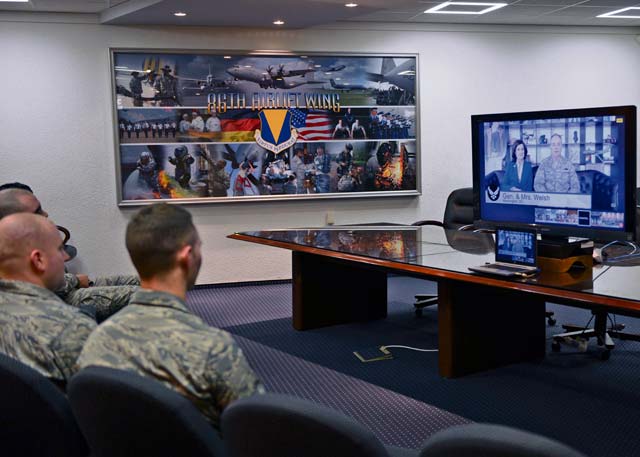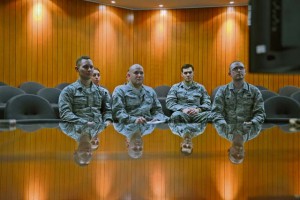
Airmen and spouses on Ramstein were afforded the unique opportunity to join their wingmen from five other bases around the globe to ask the chief of staff of the Air Force, Gen. Mark A. Welsh III, and his wife, Betty, questions during a video conference Jan. 16.
The video chat was designed to allow Airmen the chance to have their voices heard in a small, informal setting while also affording Welsh a better look at what is on most Airmen’s minds.
During the call, Airmen from Joint Base San Antonio-Lackland, Texas; U.S. Air Force Academy, Colorado; F.E. Warren Air Force Base, Wyoming; Joint Base Elmendorf-Richardson, Alaska; Al Udeid Air Base, Qatar; and various units at Ramstein, asked the Air Force’s highest ranking leader myriad questions ranging from concerns they have about Air Force policies to the effects of the high ops tempo on the force and where he sees us in the future.

“The last couple of years have been really tough for us,” Welsh said. “We’ve been through a furlough of our civilian work force, sequestration, an increase of operations tempo and force management, but now, we are at a turning point. These problems that we have gone through are behind us and even though we will have less resources than we were used to in the past, we are better able to handle it.”
Mrs. Welsh also took questions from several spouses, but one Ramstein Airman had a very important question for her. Senior Airman Lindsay Meyer, 721st Aerial Port Squadron, wanted to know what the Welsh family does to find balance between work and home life and what they would suggest for a mil-to-mil family.
“Communication is always the most important thing,” Mrs. Welsh said. “No matter what is going on, you both need to continue to talk to each other and plan your lives together.”
While providing two-way dialog between Welsh and Airmen and Mrs. Welsh and the spouses was the primary purpose, the video conference was also a test-bed for more cost-effective communications efforts.
“We are always going to try to figure out more and more ways to communicate with the Airmen,” Welsh said. “We are trying to focus on communication, which is particularly hard to do in a large organization like this, but new options like these provide easier access and ultimately save time and money.”
With little to no cost to the Air Force, these types of conferences can be scheduled more often, providing something invaluable to Airmen: the ability to communicate with their leaders directly and understand their perspective.
“It was good to know that General Welsh is genuinely concerned about our well-being and have a direct line to him to be able to ask questions that matter to us,” said Tech. Sgt. William Sage, a member of the 313th Expeditionary Operations Support Squadron. “We were able to ask the general more personal questions because of the small group setting, which was very different from what we are used to inside hangars during all-calls.”


